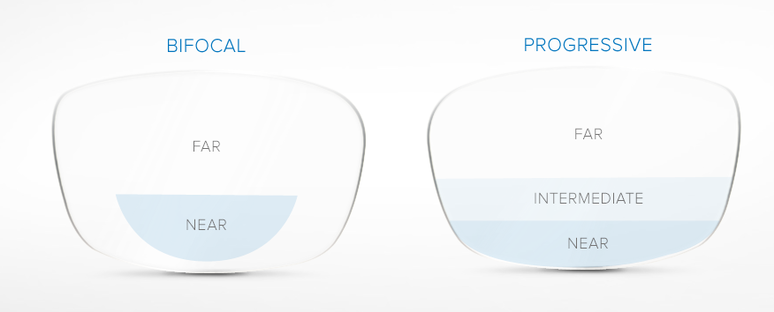Bifocal vs progressive lenses, what’s the difference and which is better?

Are you in the market for glasses? There are so many different types of lenses to choose from, and it can be difficult to know which is best for your individual needs. If you have struggled with vision problems that require two separate prescriptions at once, such as presbyopia or astigmatism, then bifocal and progressive lenses may both offer a viable solution. In this post we will compare bifocal versus progressive lenses to help you determine which is right for you. We'll also take a look at the advantages and disadvantages of each type of lens, plus answer some frequently asked questions about each one. Armed with this knowledge, you'll be able to make an informed decision about which form of lens - either bifocal or progressive - is suitable for your lifestyle and visual demands!
The Different Types of Lenses for Glasses
There are different kinds of lenses you can get for your glasses. Bifocal and progressive lenses are two types that help if you have problems with seeing close up or when far away. Each has its own advantages and disadvantages, so it's important to know which one is right for you.
Bifocal Lenses: Bifocal lenses have two distinct viewing areas. The top part of the lens helps you see far away, while the bottom area is magnified so you can see close up. You'll notice a visible line or lines on your bifocal lenses that separate these two portions. They are designed to be used for everyday tasks such as reading or working on the computer, but they don't offer a smooth transition between near and far vision.
Progressive Lenses: Progressive lenses are also known as "no-line bifocals," because there is no visible line separating the two viewing areas. They feature a gradual change in power from the top of the lens to the bottom, allowing for a smoother transition between far and near vision. This design provides you with a wider field of view, making them better suited for activities that require you to shift your focus between distant and close-up objects often.
Advantages and Disadvantages of Bifocal Lenses
The main advantage of bifocal lenses is that they are more affordable than progressive lenses. Additionally, bifocals are more comfortable to use, as the line between near and far vision is very clear and easy to spot. The downside of this type of lens is that it can be difficult to adjust to different visual demands if you're constantly switching between activities requiring near or far vision.
Advantages and Disadvantages of Progressive Lenses
The main benefit of progressive lenses is that they provide an uninterrupted field of vision, making it easy to switch between activities requiring near and far vision. Additionally, this type of lens has a more natural look than bifocals. The downside is that progressive lenses are much more expensive than bifocals, and they can take some time to get used to. Additionally, they may cause some distortion when looking at objects from the sides or in peripheral vision.
How to Choose Between Bifocal and Progressive Lenses
When it comes to choosing between bifocal and progressive lenses, the best option depends on your lifestyle and visual needs. If you are only engaging in activities that involve near or far vision but not both, such as reading or driving, then a pair of bifocals may be the better choice. On the other hand, if you often switch between tasks requiring near and far vision, then progressive lenses may be the better option. Ultimately, it's best to consult with an optometrist or eye care specialist to determine which type of lens will work best for you.
Where to Go For a Professional Comprehensive Eye Exam
Taking care of your eyesight is important, and getting a regular eye exam is essential for maintaining your eye health. However, not all eye exams are created equal. When it comes to getting the most comprehensive exam possible, it's important to go to a reputable professional eye care provider.
The Optometrists and ophthalmologists at North Fulton Eye Center are trained to perform more thorough exams than your general healthcare provider can provide, and they have the specialized equipment necessary to detect any potential issues with your eyesight. So when it comes time for your next eye exam, don't settle for anything less than a professional, comprehensive eye exam to ensure your eyes stay healthy for years to come.
Tips on Taking Care of Your Contact Lenses or Frames
Your eyesight is precious, so once you decide on what kind of lenses you want it's important to take good care of your contact lenses or frames. To keep your contacts in tip-top condition, always wash your hands before handling them and use only the recommended solution. Never use saliva or tap water to clean your lenses as these can cause serious eye infections.
As for your frames, make sure to clean them regularly using a microfiber cloth to avoid scratches. Don't forget to store your contacts or frames properly when not in use and to replace them as recommended by your eye doctor. With these simple tips, you can avoid eye problems and keep your vision crystal clear.
With a comprehensive eye exam and discussion of your lifestyle and needs, the decision between bifocal and progressive lenses can be an informed one . Remember, both types of lenses offer distinct advantages and disadvantages. Bifocals keep your vision clear between near and far distances with a visible line dividing the two prescriptions.
For wearers who suffer from age-related vision changes or who want to look more natural, progressives are the best choice since they provide seamless transitions between distance points with no visible lines. When taking care of either type of lens make sure to keep it clean, replace contact lenses or frames when necessary, and use only prescribed cleaning solutions/methods. Ultimately, what matters most is maintaining optimal vision health so you can see your best every day!
TESTIMONIAL

Everything was explained. Everyone was helpful, cheerful, and competent. Dr. Paré was, as always, competent, helpful, and patient.

“My visit was awesome. The tech was fantastic and of course we love Dr. Hewitt.”

Dr. Park has my full faith and confidence for me to recommend her to whomever may read this. I am pleased she has joined the practice. Her professional and exceptional caring will be evident in seconds to her patients meeting her.
OFFICE HOURS
| Week Days | 8:00 - 4:00 |
| Saturday | Closed |
| Sunday | Closed |

